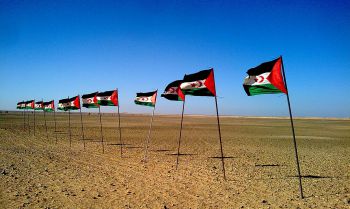Anticolonial solidarity must counter Trump’s legacies in Western Sahara, Palestine and beyond
By: Jacob Norris
Last updated: Friday, 11 March 2022

"Sahara Occidental" by Sinsistema, licensed under CC BY-NC-SA 2.0
On 10 December 2020, outgoing US President Donald Trump proclaimed that the US recognised Moroccan sovereignty over Western Sahara. This proclamation was a quid pro quo for Morocco’s acquiescence in advancing US policy concerning Israel: Morocco normalized diplomatic relations with Israel, dropping the Arab League stance of making such normalization conditional on addressing rights of Palestinians. By linking the colonial projects of Morocco towards Sahrawis and Israel towards Palestinians, Trump’s deal exposed (yet again) the US’s readiness to support colonialism. In the face of Trump’s troubling legacies, the task for those who support decolonization is to intensify the visibility of anticolonial solidarity with Sahrawis, Palestinians and other colonized peoples.
A former Spanish colony in northwest Africa, Western Sahara is one of the UN’s list of non-self-governing territories (a colony). The UN Security Council, UN General Assembly, the International Court of Justice, the African Union and the Court of Justice of the European Union have all recognised the right of the people of Western Sahara to self-determination. Yet although the highest international legal forums have consistently acknowledged Sahrawis’ right to self-determination, in parallel political acts have nevertheless obstructed that right and facilitated Morocco’s colonial occupation that began when the Kingdom partially invaded the territory in 1976.
Obstructions to Sahrawis’ right to self-determination have been a consistent feature of the long political negotiations since 1991 when the UN brokered a ceasefire between Morocco and Polisario Front, and established a UN mission for a self-determination referendum. Moroccan objections to the inclusion of “independence” as an option have left plans for a vote languishing in standstill. Similarly, Moroccan objections have pressured Morocco’s allies, including the US’s Obama administration, into dropping plans to introduce human rights monitoring to the UN mission in Western Sahara – even though Sahrawi and international human rights organizations have documented that Moroccan authorities have abused Sahrawis’ human rights.
Trump’s proclamation joins the list of political acts that have obstructed the right of the Sahrawi people to self-determination. The proclamation ignored that it is not for Trump nor any other party to determine the future of Western Sahara, since the right to do so resides solely with the Sahrawi people. In ignoring this right, the proclamation flew in the face of international law. James E Baker, former Secretary of State for the US and former Personal Envoy of the UN Secretary General to Western Sahara, condemned the proclamation’s disregard for international law.
Moreover, Trump’s decision bears the troubling hallmarks of the imperial interventionism that has long destabilized North Africa and West Asia. By endorsing Morocco’s illegitimate rule in Western Sahara, the US is facilitating and prolonging a conflict that has displaced thousands of Sahrawis whilst Morocco authorities have plundered Western Sahara’s resources, infringed the ceasefire, and continue to commit human rights abuses against Sahrawis. At the same time, the US stands to profit from its cosy relationship with Morocco: news of the deal reached the press at the same time as rumours of the final negotiations for the US to sell aerial drones to Morocco.
Trump’s actions brought a burst of international media attention to Western’s Sahara unfinished decolonization, and highlighted the Sahrawis’ predicaments that mirror those of Palestinians. Can Trump’s deal become a pivot to achieve greater international visibility and solidarity for Sahrawis’ decolonization struggle? Sahrawis’ anticolonial struggle has often remained little known in the Anglophone global north outside specialist circles. International visibility and solidarity have played key roles in past and ongoing anticolonial struggles. Transnational solidarity made it embarrassing to support the apartheid government in South Africa, and it has long been time that it should be an international embarrassment to support Morocco’s colonial occupation in Western Sahara.
With these concerns in mind, a group of concerned scholars are making a public call for solidarity with the anticolonial struggle of Sahrawis, and specifically: for the US to rescind recognition of Moroccan sovereignty over Western Sahara; for the terms of the ceasefire to be renegotiated and resumed; for the UN mission in Western Sahara to include human rights monitoring; and for the commercial exploitation of Western Sahara’s resources to cease until Sahrawis exercise their right to self-determination. All peoples have the right to self-determination; through acts of solidarity every person can support that right.
Alice Wilson is Senior Lecturer in Social Anthropology at the University of Sussex


